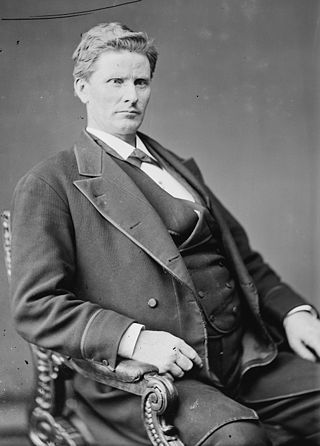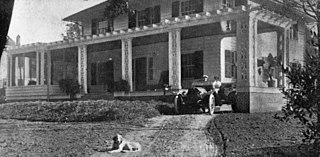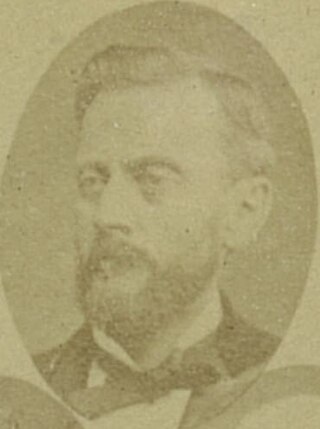Related Research Articles

The Provisional Congress of the Confederate States, fully the Provisional Congress of the Confederate States of America, was a unicameral congress of deputies and delegates called together from the Southern States which became the governing body of the Provisional Government of the Confederate States from February 4, 1861, to February 17, 1862. It sat in Montgomery, Alabama, until May 21, 1861, when it adjourned to meet in Richmond, Virginia, on July 20, 1861. In both cities, it met in the existing state capitols which it shared with the respective secessionist state legislatures. It added new members as other states seceded from the Union and directed the election on November 6, 1861, at which a permanent government was elected.

The 1st Confederate States Congress, consisting of the Confederate States Senate and the Confederate States House of Representatives, convened between February 18, 1862, and February 17, 1864. This assembly took place during the first two years of Jefferson Davis's presidency, convening at the Virginia State Capitol in Richmond, Virginia.

The 2nd Confederate States Congress, consisting of the Confederate States Senate and the Confederate States House of Representatives, met from May 2, 1864, to March 18, 1865, during the last year of Jefferson Davis's presidency, at the Virginia State Capitol in Richmond, Virginia; the Confederacy's government effectively dissolved 16 days later, when it fled Richmond on April 3, 1865. Its members were elected in the 1863 congressional elections.

William Pierce Frye was an American politician from Maine. A member of the Republican Party, Frye spent most of his political career as a legislator, serving in the Maine House of Representatives and then U.S. House of Representatives, before being elected to the U.S. Senate, where he served for 30 years before dying in office. Frye was a member of the Frye political family, and was the grandfather of Wallace H. White Jr., and the son of John March Frye. He was also a prominent member of the Peucinian Society tradition.

The 47th United States Congress was a meeting of the legislative branch of the United States federal government, consisting of the United States Senate and the United States House of Representatives. It met in Washington, D.C. from March 4, 1881, to March 4, 1883, during the six months of James Garfield's presidency, and the first year and a half of Chester Arthur's presidency. The apportionment of seats in this House of Representatives was based on the 1870 United States census. The House had a Republican majority; the Senate was evenly divided for the first time ever, with no vice president to break ties for most of this term.

Willard Saulsbury Jr. was an American lawyer and politician from Wilmington, in New Castle County, Delaware. He was a member of the Democratic Party who served as U.S. Senator from Delaware and President Pro Tempore of the U.S. Senate.

Charles William Jones was an American attorney and politician. A Democrat, he served as a United States Senator from Florida from 1875 to 1887. Jones abandoned his seat near the end of his second term, and it remained vacant for a year until a successor was elected. Jones was later diagnosed as mentally ill, and was hospitalized at a Dearborn, Michigan asylum for seven years before his death.
John W. A. Sanford Sr. was a plantation manager, military officer, land agent, and politician from Georgia. He served as Secretary of State of Georgia and in the United States House of Representatives.
Alfred Brown Osgood was an American legislator and Christian minister in Florida.
Dernard E. Quarterman was an American Christian minister and politician.

Theodore Tiffany Turnbull was an American lawyer, cotton plantation owner, and state legislator in Florida from 1915 until 1929. He served as Speaker Pro Tempore of the Florida House of Representatives and President of the Florida Senate.
Edward I. Alexander Sr. was a grocer, state legislator, city councilman, and postmaster in Florida. He represented Madison County, Florida in the Florida House of Representatives in 1877, 1879, and 1885. He sought to represent Madison County, Florida in the Florida House of Representatives in 1885.

Gray C. Selby was a farmer, teacher, and state legislator in Mississippi. He represented Marshall County, Mississippi in the Mississippi House of Representatives in 1880 and 1881.
William James Willing Jr. was a lawyer and politician in Mississippi. He lived in Crystal Springs, Mississippi and represented Copiah County in the Mississippi House of Representatives in 1870. He resigned his seat in 1872.
Killis B. Bonner was an American farmer and state legislator in Florida. He represented Marion County, Florida in the Florida House of Representatives in 1877.

Reuben Oscar Reynolds was a lawyer and state senator in Mississippi. He represented Monroe County and Chickasaw County in the Mississippi Senate for several terms during and after the Reconstruction era ended.
Harry Eubank King (1902–1981) was a lawyer and state legislator in Florida. He served in the Florida Senate from 1941 to 1956. He was a Democrat. The Florida Archives have photographs of him. He represented Polk County, the 7th District.
Auburn H. Erwin was an American teacher, A.M.E. minister, justice of the peace, constable, and state legislator in Florida. He was a delegate to the 1868 Florida Constitutional Convention and represented Columbia County, Florida in the Florida House of Representatives from 1868-1870. He was a constable in Duval County in 1872 and in 1878 and 1879. He served as a justice of the peace for Duval County in 1873 and 1874.
Charles Minor was a lawyer and politician in Arkansas. He served in the Arkansas House of Representatives. He served two terms in the Arkansas House. He testified he lived in Jackson County.
References
- ↑ Grenier, Bob (February 16, 2014). Central Florida's Civil War Veterans. Arcadia Publishing. ISBN 9781467112024 – via Google Books.
- ↑ "Florida Historical Quarterly". Florida Historical Society. February 15, 1965 – via Google Books.
- ↑ House, United States Congress (February 15, 1882). "Miscellaneous Documents: 30th Congress, 1st Session - 49th Congress, 1st Session" – via Google Books.
- ↑ "General Acts and Resolutions Adopted by the Legislature of Florida". Office of the Floridian and Journal. February 15, 1881 – via Google Books.
- ↑ "Congressional Serial Set". U.S. Government Printing Office. February 15, 1882 – via Google Books.
- ↑ "President of the Seminole Tribe of Florida, Inc., Joe Dan Osceola with Maynard Abrams and Horst Grabs". Florida Memory . Retrieved February 15, 2021.
- ↑ "Wedding picture of Theodore H. Willard and Alice Roberta Brown - High Springs, Florida". Florida Memory . Retrieved February 15, 2021.
- ↑ "Theodore Hartridge Willard, Jr. at the age of three". Florida Memory . Retrieved February 16, 2021.